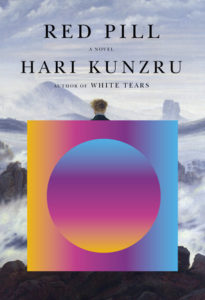
Our quintet of quality reviews this week includes Brandon Taylor on Emma Cline’s Daddy, Merve Emre on Elena Ferrante’s The Lying Life of Adults, Ron Charles on Yaa Gysai’s Transcendent Kingdom, Ben Horowitz on Sudhir Hazareesingh’s Black Spartacus, and Randall Colburn on Hari Kunzru’s Red Pill.
“In an era whose ascendant short-story practitioners lean into high-concept experiments of genre and form, Emma Cline represents something of a throwback. The 10 stories that constitute her first collection, Daddy, are almost classical in structure—you won’t find a fragmentary collage, list or screenplay among them. Though she’s not one for a sudden, curious departure of voice or dissolution of the fourth wall, Cline has an unnerving narrative proprioception, and her stories have the clean, bright lines of modernist architecture … As for her style, she seems to eschew the telegraphic mode made popular by writers like Sally Rooney or Rachel Cusk for something at once direct and musical. Cline’s idiom is earnestness punctuated by millennial cool—but nothing too fussy, everything in just the right place … The aesthetic pleasure of Cline’s writing is anesthetizing. So much so that one could conceivably read these stories with the same drugged passivity with which one shuffles through a lifestyle catalog. But that would be a mistake … Cline is an astonishingly gifted stylist, but it is her piercing understanding of modern humiliation that makes these stories vibrate with life … the characters shift uncomfortably through the beautifully appointed shoe box dioramas of their lives, aware at once of their own insignificance and also of their desire for prominence. They ask if anything matters as though nothing does, and yet hope to be contradicted. But perhaps we all do. Perhaps, in these brilliant stories, that is the most daring and human thing of all.”
–Brandon Taylor on Emma Cline’s Daddy (The New York Times Book Review)
“… exquisitely moody … Life of Adults itself…invites us to evaluate lying not only as a moral problem, but also as an aesthetic challenge—to ask whether a lie can ever be elevated into an art form … It is a novel of disillusionment, as the literary critic Georg Lukács once described the category: a novel that strips away its young protagonist’s major social relationships to elevate her interiority … this marvelously disconcerting novel of disillusionment is a product of the grace extended to the liar by the writer. Only the writer’s truthful lies can mirror the liar’s petty ones with the clear sight needed to affirm the intensity of her past. Only the writer knows how to conjure desire; sympathize with misjudgment; rebuke carelessness; disappoint mercifully. Always, Ferrante’s fiction reminds us that sometimes you need someone else to help gather the scattered fragments of your existence.”
–Merve Emre on Elena Ferrante’s The Lying Life of Adults (The Atlantic)
“Homegoing wasn’t beginner’s luck. Gyasi’s new novel, Transcendent Kingdom, is a book of blazing brilliance. What’s more, it’s entirely unlike Homegoing …still and ruminative—a novel of profound scientific and spiritual reflection that recalls the works of Richard Powers and Marilynne Robinson. Not that there’s anything derivative about this story. Indeed, Gyasi’s ability to interrogate medical and religious issues in the context of America’s fraught racial environment makes her one of the most enlightening novelists writing today … The placid surface of Gifty’s professional life betrays none of the intellectual and emotional torment she relays in the lines of this urgent novel … A double helix of wisdom and rage twists through the quiet lines of this novel … remarkable.”
–Ron Charles on Yaa Gysai’s Transcendent Kingdom (The Washington Post)
“A difficult task indeed—which makes Sudhir Hazareesingh’s Black Spartacus all the more remarkable. The Oxford academic deftly tells the byzantine and fragmented history to paint perhaps the sharpest portrait yet of Louverture … While previous attempts have often misinterpreted Louverture’s deep relationships with the Europeans as some kind of racial or revolutionary betrayal, Hazareesingh illuminates his subject’s ability to incorporate political and military strategies from various cultures and recast them in a more powerful form. This insight provides a road map to understanding why the actions for which Louverture has been most criticised are what made him so effective … provides new and important insights into seminal events such as the initial insurrection of 1791 … If one were to quibble with Hazareesingh, it might be with the light attention paid to some of the other central characters such as Jean-Jacques Dessalines, the Haitian general and later ruler, as we never fully understand his motivations or the reason behind his ultimate betrayal of Louverture. Ultimately, however, Black Spartacus is a triumph. It takes a nearly impossibly complex history and weaves it into a compelling and accurate narrative that reads like fiction.”
–Ben Horowitz on Sudhir Hazareesingh’s Black Spartacus: The Epic Life of Toussaint Louverture (The Financial Times)

“Kunzru is wise to keep the narrative both rooted in the real world and mostly divorced from the current moment more specifically. By doing so, he’s able to isolate the behaviors inherent to the online culture wars—the baiting, the debating, the veils of humor—and view them through a historical lens … But Kunzru’s story isn’t strictly a critique. Anybody who’s struggled with shitposting’s influence on modern discourse, the layered irony and perpetual smirk, will identify with the narrator … He worries he’s the butt of a joke he doesn’t understand. He obsesses over what he claims to hate. He wants life to be like a poem, despite all evidence to the contrary. Kunzru finds the humor and humanity in it all, but even as the story spirals into well-earned hysteria, he never downplays the severity of the mental derangement unfolding on both sides of the aisle in a post-truth era, nor the ways each can intersect in the realm of conspiracy.”
–Randall Colburn on Hari Kunzru’s Red Pill (The AV Club)
If you buy books linked on our site, Lit Hub may earn a commission from Bookshop.org, whose fees support independent bookstores.

